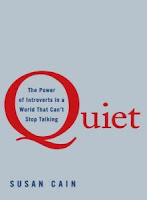This blog started in 2004 as a diary of my reading habits and contains over 1300 reviews. As of 2018, I’ve combined other blogs I wrote into one. To see my current reviews, visit northmelbournebooks.com.au. This blog is maintained only intermittently.
Wednesday, April 25, 2012
Quiet: The Power of Introverts in a World That Can't Stop Talking, by Susan Cain
Staff Review by Chris Saliba
As an introvert herself, you’d expect Susan Cain’s style to be gentle and thoughtful. This, however, doesn't stop her arguments from being persuasive and compelling. The contemporary world values extroverts too much, says Cain, while ignoring the talents of introverts. Introverts bring deep thinking and a patient approach, allowing them to solve difficult problems that require a subtle approach. Susan Cain shows that introverts, from all walks of a life - business, government, law, technology, science – use their introversion to achieve greatness. Quiet seeks to demonstrate that the popular stereotype of introverts as airy dreamers or hopeless nerds is wrong.
It’s not hard to disagree with Susan Cain’s argument that the extroverted personality type is handsomely rewarded (with fame, riches, status) at every corner in contemporary Western culture. One glance at our media drenched world tells the story in a nut-shell: talentless extroverts are ubiquitous on television, computer and iPhone screens. Susan Cain argues that we have let flashy extroverts dazzle us with their talk, charisma and presence, ignoring the quiet yet powerful achievements of introverts.
Worse still, by focusing on the sometimes dubious achievements of extroverts, we have sidelined introverts and blinded ourselves to their key skills: the ability for deep thought, a long term view of problem solving and sustained levels of concentration. Introverts are labelled as either shy social misfits or weird reclusive nerds. Yet, as Susan Cain shows, the list of people whose introversion has contributed to their high achievements is a long one. From stock market guru Warren Buffet to computer genius Stephen Wozniak, introverted high-achievers use their patience and sustained levels of concentration to solve problems that require subtlety of thought.
Using the latest science to back up her arguments, Cain challenges a lot of current orthodoxies. She argues that businesses that prize team work models would be better off sending their employees to private work booths to nut out problems (the research on the deleterious effects of open plan offices is alarming), rather than being subjected to collective brain storming sessions.
Some of the neuroscience on the subject of introversion is also fascinating. One scientist claims to be able to figure out whether babies as young as four months old will become introverts in later life. It all comes down to how sensitive the baby is to outside stimulus, like noise or colour. The more sensitive as a baby, the more introverted in adult life. Why? Introverts are highly sensitive people, whereas extroverts are less sensitive to their surrounds and don’t experience the same level of impact. Again, Cain backs all of this up with the latest in scientific research. In fact, extroverts have been found to need more and stronger stimulus than introverts. Extroverts don’t feel things as much as introverts, while introverts feel things too much, and hence need to sequester themselves away. The world is just too noisy for introverts.
Quiet does not argue against extroversion, but simply makes the case that more balance is needed. Introverts need to be taken more seriously in all facets of life – business, government, law – because to ignore them is to miss their deep well of talents. We still need extroverts, too, Susan Cain tells us, as the world would be a dull place without them.
As you’d expect, Susan Cain’s prose is gentle and thoughtful. Her arguments and analysis, while quietly presented, are highly persuasive and compelling.
Quiet: The Power of Introverts in a World That Can’t Stop Talking, by Susan Cain ISBN:
9780670916764 RRP: $29.95
Labels:
Psychology / Self Help,
Susan Cain
Subscribe to:
Post Comments (Atom)

No comments:
Post a Comment